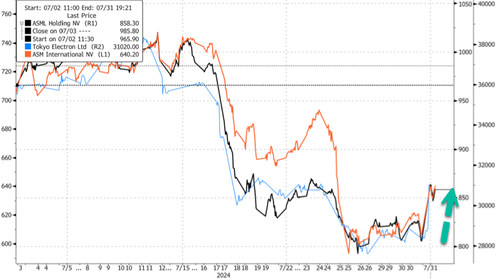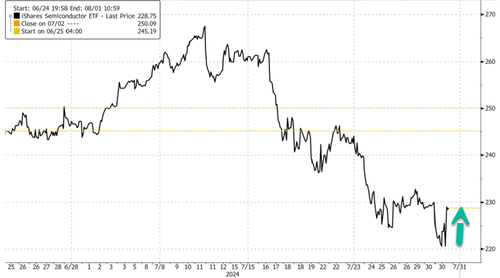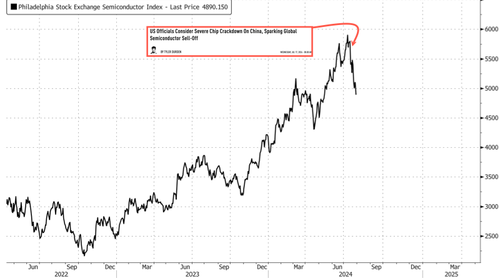According to a new Reuters report, the US plans to exempt semiconductor equipment makers in Japan, the Netherlands, and South Korea from the upcoming Foreign Direct Product rule targeting China's tech complex.
This rule will be introduced next month and aims to restrict the export of products utilizing American tech to about six Chinese chip manufacturing facilities. Yet another sign that US-Sino relations continue to deteriorate amid the ongoing tech/AI war between the two superpowers.
The new rule will halt the exports of semiconductor manufacturing equipment from certain foreign countries to Chinese chipmakers. However, with shipments from Japan, the Netherlands, and South Korea, excluded, this sent shares of Dutch chip equipment manufacturers ASML (+6.5% in EU trading) and ASM International (+5.5% in EU trading) and in Tokyo, Tokyo Electron (+7.4% in Tokyo trading), all higher.
The news also forced a bid in semiconductor stocks tracked by the iShares Semiconductor ETF (SOXX), which was up nearly 4% in premarket trading in New York.
Reuters noted further:
The US also plans to add about 120 Chinese entities to its restricted trade list which will include a half dozen chipmaking factories known as fabs, plus toolmakers, providers of EDA (electronic design automation) software and related companies.
On July 17, Bloomberg reported on the Foreign Direct Product rule being discussed as a way to prevent China from accessing high-tech semiconductor technology.
At the time, we titled the note "US Officials Consider Severe Chip Crackdown On China, Sparking Global Semiconductor Sell-Off," which did exactly that...
Amir Anvarzadeh of Asymmetric Advisors told Bloomberg, "The only reason we can think of why the US would exclude SPEs made in the Netherlands, Japan and Korea is that those countries will likely conform to its demands for stricter export policies to China without the US needing to resort to invoking the Foreign Direct Product rule."
"The market may be mistaken to bid these stocks higher with the view that companies domiciled in these countries are free to export chip-making tools that the US wants restricted to China," Anvarzadeh said.
Political elites in Washington are tightening the noose on semiconductor exports to China, if that's chips and/or equipment, not just in the US but in allied countries. They're desperately trying to crush artificial intelligence and quantum computing development in the world's second-largest economy as the tech war between the US and China rages on.
According to a new Reuters report, the US plans to exempt semiconductor equipment makers in Japan, the Netherlands, and South Korea from the upcoming Foreign Direct Product rule targeting China's tech complex.
This rule will be introduced next month and aims to restrict the export of products utilizing American tech to about six Chinese chip manufacturing facilities. Yet another sign that US-Sino relations continue to deteriorate amid the ongoing tech/AI war between the two superpowers.
The new rule will halt the exports of semiconductor manufacturing equipment from certain foreign countries to Chinese chipmakers. However, with shipments from Japan, the Netherlands, and South Korea, excluded, this sent shares of Dutch chip equipment manufacturers ASML (+6.5% in EU trading) and ASM International (+5.5% in EU trading) and in Tokyo, Tokyo Electron (+7.4% in Tokyo trading), all higher.
The news also forced a bid in semiconductor stocks tracked by the iShares Semiconductor ETF (SOXX), which was up nearly 4% in premarket trading in New York.
Reuters noted further:
The US also plans to add about 120 Chinese entities to its restricted trade list which will include a half dozen chipmaking factories known as fabs, plus toolmakers, providers of EDA (electronic design automation) software and related companies.
On July 17, Bloomberg reported on the Foreign Direct Product rule being discussed as a way to prevent China from accessing high-tech semiconductor technology.
At the time, we titled the note "US Officials Consider Severe Chip Crackdown On China, Sparking Global Semiconductor Sell-Off," which did exactly that...
Amir Anvarzadeh of Asymmetric Advisors told Bloomberg, "The only reason we can think of why the US would exclude SPEs made in the Netherlands, Japan and Korea is that those countries will likely conform to its demands for stricter export policies to China without the US needing to resort to invoking the Foreign Direct Product rule."
"The market may be mistaken to bid these stocks higher with the view that companies domiciled in these countries are free to export chip-making tools that the US wants restricted to China," Anvarzadeh said.
Political elites in Washington are tightening the noose on semiconductor exports to China, if that's chips and/or equipment, not just in the US but in allied countries. They're desperately trying to crush artificial intelligence and quantum computing development in the world's second-largest economy as the tech war between the US and China rages on.



